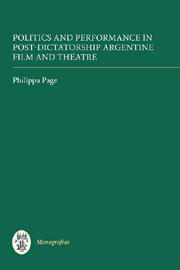Book contents
- Frontmatter
- Contents
- List of Illustrations
- Dedication
- Acknowledgements
- Introduction
- ‘Theatre[s] of Cruelty’ and Politics of Performance in the Work of ‘Teatrista’ Eduardo Pavlovsky and Filmmaker Fernando E. Solanas
- De-mythifying the Postmodern ‘Opium of the People’: Theatre and Cinema versus Television
- ‘Metáforas del Fracaso’ or ‘a Family Romance’? Resuscitating Aesthetic Lineages
- Biodramas/Biography/Biopolitics:Projects of ‘Convivencia’ in New Argentine Cinema and Theatre
- Conclusion
- Filmography
- Bibliography
- Index
Biodramas/Biography/Biopolitics:Projects of ‘Convivencia’ in New Argentine Cinema and Theatre
Published online by Cambridge University Press: 05 February 2013
- Frontmatter
- Contents
- List of Illustrations
- Dedication
- Acknowledgements
- Introduction
- ‘Theatre[s] of Cruelty’ and Politics of Performance in the Work of ‘Teatrista’ Eduardo Pavlovsky and Filmmaker Fernando E. Solanas
- De-mythifying the Postmodern ‘Opium of the People’: Theatre and Cinema versus Television
- ‘Metáforas del Fracaso’ or ‘a Family Romance’? Resuscitating Aesthetic Lineages
- Biodramas/Biography/Biopolitics:Projects of ‘Convivencia’ in New Argentine Cinema and Theatre
- Conclusion
- Filmography
- Bibliography
- Index
Summary
En un mundo descartable, ¿qué valor tienen nuestras vidas, nuestras experiencias, nuestro tiempo? Biodrama se propone reflexionar sobre esta cuestión. Se trata de investigar cómo los hechos de la vida de cada persona —hechos individuales, privados— constituyen la Historia.
Vivi Tellas, cited in Mariana Obersztern, El aire alrededor, 46For millennia, man remained what he was for Aristotle: a living animal, with the additional capacity for a political existence; modern man is an animal whose politics places his existence as a living being in question.
Michel Foucault, The History of Sexuality, 143One of the most interesting points of comparison to be made between recent cinema and theatre is in the appropriations that certain films and plays make from the documentary genre. New Argentine Cinema is a well established critical label for what in fact represents a somewhat heterogeneous group of films produced since 1995. The lack of any unifying ideology or programme, however, means that it falls short of qualifying per se as a movement (Wolf 2002: 30). New Argentine Cinema is generally characterised by its minimalist aesthetic (blurring documentary with fiction), its emphasis on micropolitical, everyday existences, also typical of documentary, and the fact that it shuns macro-political allegories that attempt to give any picture of the social totality (Wolf 2002: 29-43). Its almost exclusive focus on contemporary scenarios, often on those living on society's peripheries (Wolf 2002: 33), ‘push[es] the boundaries of Argentine national identity through low-budget cinema’ (Falicov 2007: 152).
- Type
- Chapter
- Information
- Politics and Performance in Post-Dictatorship Argentine , pp. 127 - 160Publisher: Boydell & BrewerPrint publication year: 2011



